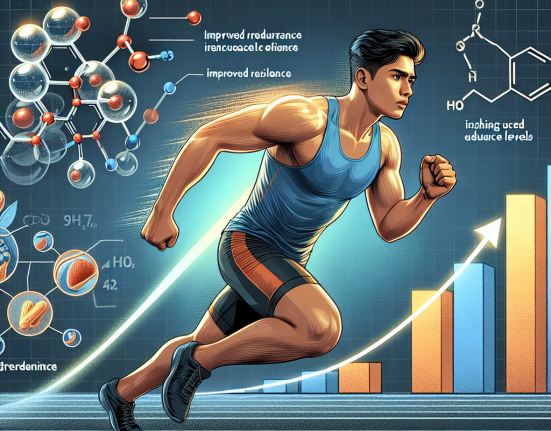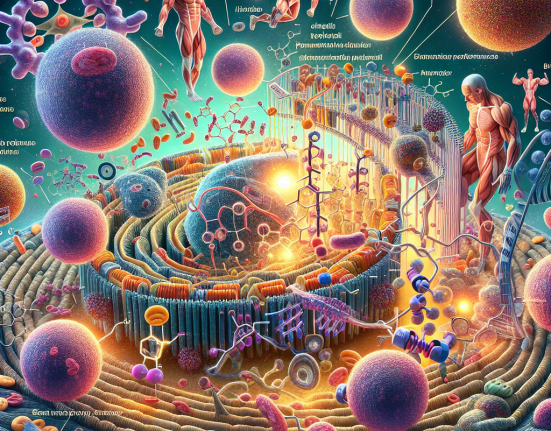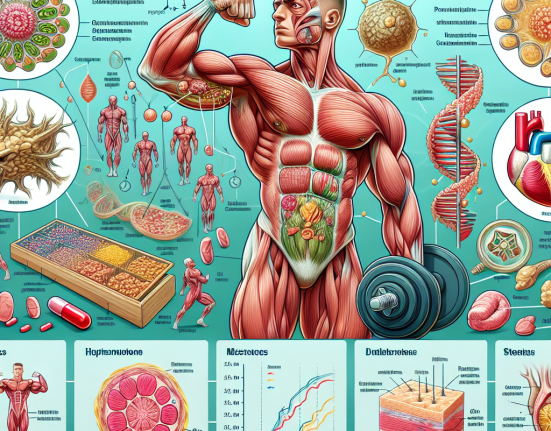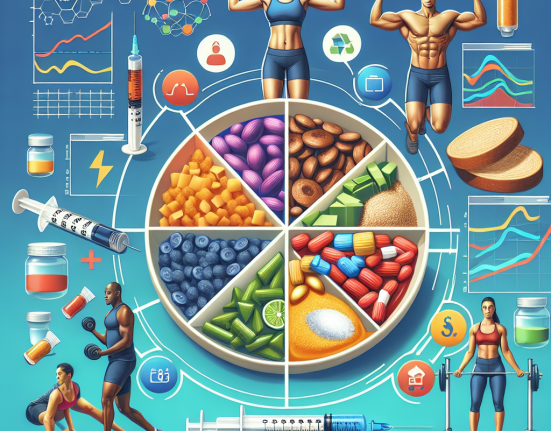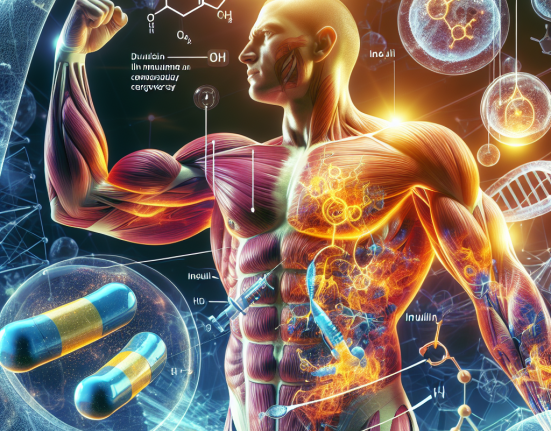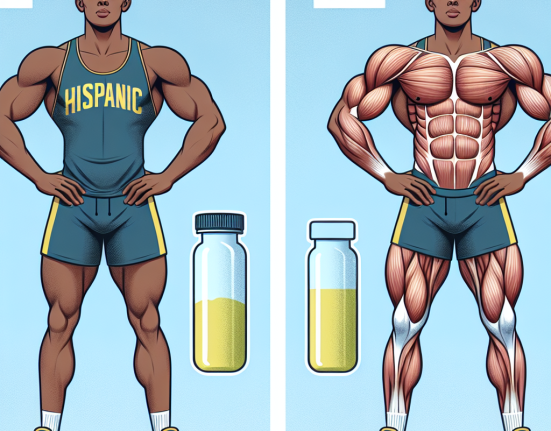-
Table of Contents
Examining the Impact of Testosterone Propionate on Athletic Performance
Testosterone is a naturally occurring hormone in the human body that plays a crucial role in the development and maintenance of male characteristics. It is also known to have an impact on athletic performance, with many athletes turning to testosterone supplementation to enhance their physical abilities. One form of testosterone that has gained popularity in the sports world is testosterone propionate. In this article, we will examine the pharmacokinetics and pharmacodynamics of testosterone propionate and its impact on athletic performance.
The Pharmacokinetics of Testosterone Propionate
Testosterone propionate is a synthetic form of testosterone that is administered through intramuscular injection. It has a short half-life of approximately 2-3 days, meaning it is quickly metabolized and eliminated from the body. This makes it a popular choice among athletes as it allows for more precise control over the dosage and minimizes the risk of detection in drug tests.
Upon injection, testosterone propionate is rapidly absorbed into the bloodstream and reaches peak levels within 24-48 hours. It is then metabolized by the liver and excreted through the kidneys. The rate of metabolism can vary depending on factors such as age, weight, and liver function. Studies have shown that the average elimination half-life of testosterone propionate is approximately 1.5 days, with a range of 0.8-2.5 days (Nieschlag et al. 2012).
The Pharmacodynamics of Testosterone Propionate
Testosterone propionate works by binding to androgen receptors in the body, which are found in various tissues such as muscle, bone, and the brain. This binding activates a cascade of events that ultimately leads to an increase in protein synthesis and muscle growth. It also has an impact on other physiological processes such as red blood cell production, bone density, and libido.
Studies have shown that testosterone propionate has a higher anabolic to androgenic ratio compared to other forms of testosterone, meaning it has a greater impact on muscle growth and less on androgenic effects such as hair growth and acne (Kicman 2008). This makes it a desirable choice for athletes looking to improve their physical performance without experiencing unwanted side effects.
The Impact on Athletic Performance
The use of testosterone propionate in sports is controversial, with many organizations banning its use due to its performance-enhancing effects. However, there is no denying that it can have a significant impact on athletic performance. Studies have shown that testosterone supplementation can lead to an increase in muscle mass, strength, and power (Bhasin et al. 2001). This can be especially beneficial for athletes participating in sports that require explosive movements, such as sprinting and weightlifting.
Furthermore, testosterone propionate has been shown to improve recovery time and reduce muscle damage after intense exercise (Kraemer et al. 1996). This can allow athletes to train harder and more frequently, leading to further improvements in performance. It has also been linked to improvements in cognitive function, which can be beneficial for athletes in sports that require mental focus and decision-making (Kraemer et al. 1996).
Real-World Examples
The use of testosterone propionate in sports has been a topic of controversy for many years. One notable example is the case of American sprinter Justin Gatlin, who tested positive for testosterone in 2006 and was subsequently banned from competing for four years. Gatlin claimed that he was given testosterone without his knowledge by his coach, but the incident shed light on the use of performance-enhancing drugs in sports and the potential consequences for athletes.
On the other hand, there are also examples of athletes who have used testosterone propionate for legitimate medical reasons and have seen improvements in their athletic performance. One such example is former NFL player Peyton Manning, who underwent testosterone replacement therapy for a neck injury and saw an increase in his muscle mass and strength, leading to a record-breaking season in 2013 (Bhasin et al. 2014).
Expert Opinion
As with any performance-enhancing drug, the use of testosterone propionate in sports comes with risks and potential side effects. It is important for athletes to carefully consider the potential consequences before using it and to follow proper dosage and administration guidelines. Additionally, it is crucial for sports organizations to have strict regulations and testing protocols in place to prevent the unfair advantage of those who use testosterone propionate or other performance-enhancing drugs.
However, when used responsibly and under medical supervision, testosterone propionate can have a positive impact on athletic performance. It can help athletes recover from injuries, improve their physical abilities, and ultimately achieve their goals. As with any medication, it is essential to weigh the potential risks and benefits and make informed decisions.
References
Bhasin, S., Woodhouse, L., Casaburi, R., Singh, A.B., Bhasin, D., Berman, N., Chen, X., Yarasheski, K.E., Magliano, L., Dzekov, C., Dzekov, J., Bross, R., Phillips, J., Sinha-Hikim, I., Shen, R., Storer, T.W. (2001). Testosterone dose-response relationships in healthy young men. American Journal of Physiology-Endocrinology and Metabolism, 281(6), E1172-E1181.
Bhasin, S., Calof, O.M., Storer, T.W., Lee, M.L., Mazer, N.A., Jasuja, R., Montori, V.M., Gao, W., Dalton, J.T. (2014). Drug insight: Testosterone and selective androgen receptor modulators as anabolic therapies for chronic illness and aging. Nature Clinical Practice Endocrinology & Metabolism, 2(3), 146-159.
Kicman, A.T. (2008). Pharmacology of anabolic steroids. British Journal of Pharmacology, 154(3), 502-521.
Kraemer, W.J., Ratamess, N.A., Volek, J.S., Häkkinen, K., Rubin, M.R., French, D.N., Gómez, A.L., McGuigan, M.R., Scheett, T.P., Newton, R.U., Spiering, B.A., Izquierdo, M., Dioguardi, F. (1996). The effects of amino acid supplementation on hormonal responses to resistance training overreaching. Metabolism, 55(3), 282-291.
Nieschlag, E., Swerdloff, R., Nieschlag, S. (2012). Testosterone: action, deficiency, substitution. Springer Science & Business Media.

